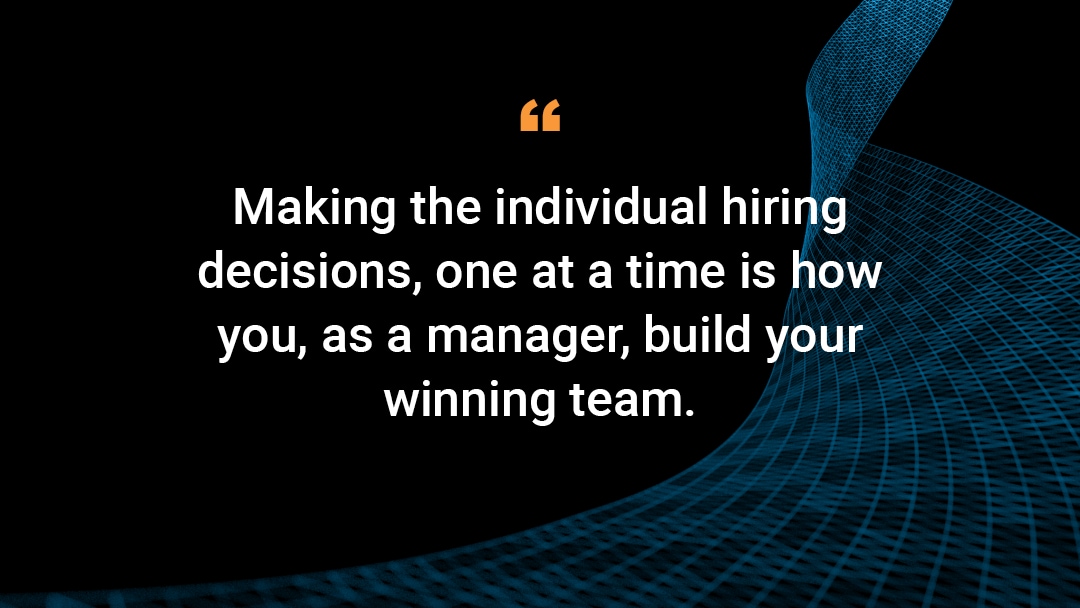Optimizing for Performance, One Hire at a Time: Part 1

It's a lot of fun to imagine and design the best team. As managers, it's rare that we get to build a team from the ground up and all at once. Often we're given the ability to hire incrementally - one or two people, replacing someone who left or starting up a project. Even if we are building a team from scratch, we don't often get to hire a whole team at once, we hire one or two people and then fill in around them.
This post, the first of three, examines how to select those hires for the best team performance - by developing a vision of success for the future team and analyzing what you need in a hire. The second post will discuss how to connect those needs to a concrete plan to identify them in an interview setting. Finally, the last post will explore what kinds of "culture fit" should, and should not, be taken into account in a hiring decision.
Making the individual hiring decisions, one at a time is how you, as a manager, build your winning team.
How do you take a couple of internal hires, a couple of external hires, and the intern your boss had two jobs ago and decide that these are the people that will fit together and make the team you need?
Start with taking a clear look at what you actually need. You might be saying "We're hiring a replacement for Nancy," but the odds of getting someone with Nancy's precise skills and working style are slim and that may not be what you need anyway! The team is going to grow and change. You have the responsibility to think through which of those changes are productive and which aren't.
Look at what the team needs to grow toward today and tomorrow, even if you're technically filling a previously held role. Although Nancy was an utter superstar, and will be missed, are her skills or strengths what the team needs today? Write down what success looks like for your team and what challenges they're facing. I like to use a big white board and free brainstorm, connecting needs and desires to concrete skills and how to test for and identify those skills.Write down what skills the team needs now. I add in what kinds of skills and abilities have led to success for the current members of my team - with the understanding that hiring someone new means I have the opportunity to gain something different than what I can get from my current team.
Sometimes, you have immediate, concrete needs. For example, if you're starting a big project in a tech area that no one on your team has experience with, it may be an urgent need to hire in some of that experience. Often, you may have some preferences - you've been thinking about positioning your team to do more public facing work or to dig deeper into malware analysis. However, if you haven't made any immediate commitments, you might be able to hire a more junior team member and focus on growth and development. This assumes you have cultivated a team culture that encourages growth and learning for all. I have been faced with making hiring decisions between well qualified candidates that would fill different spaces of my current needs and the desires for my team. I had to make my decision based on what training they would need compared to what my team had available to give them. In at least one case, a candidate who would need extensive coaching from an already overstretched team member was declined in favor of a candidate whose training needs could be met from a longer list of people.
Often, I end up with some hard tech skills and a bunch of other stuff. That "stuff" becomes the core of my recruiting work. It's relatively easy to test for the ability to use specific technologies. It's more complicated to test for "can communicate with teams X, Y, and Z" by reading a resume. If I have a team that is going to be asked to change quickly and adapt to changing circumstances (as one often needs in security), I have things like "learns quickly," "good independent judgment," and "asks good questions" on my wish list.
All of this lets you build a vision of what you want your future team to be capable of and what skills need to be present to support those capabilities. You can then extrapolate what are the most desired or needed skills to find in a candidate and what areas would be really nice to have. Then comes the hard part, figuring out how to identify those skills.



